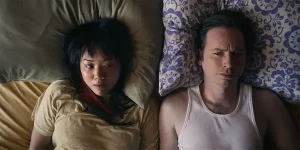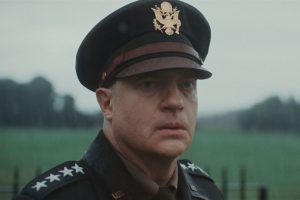
“What’s in the box?” The very fact that you just heard Brad Pitt‘s unique delivery in your head demonstrates how iconic that line has become. The question and reveal brought David Fincher‘s unrelentingly bleak crime thriller, Seven, to a head (sorry) and confirmed a hopelessly despairing worldview.
The box, of course, contained the severed head of Tracy (Gwyneth Paltrow), the sweet wife to Pitt’s detective David. The disembodying is the final move by the serial killer John Doe (Kevin Spacey), who based his crimes on Catholicism’s Seven Deadly Sins. Doe killed Tracy out of Envy, driving David to kill him out of anger. Together Wrath and Envy are punished.
Although that upsetting climax was indeed in the script by Andrew Kevin Walker, Pitt recently revealed that some at the studio New Line Cinema wanted something else entirely in that box.
Speaking with GQ, Pitt and his Wolfs co-star George Clooney looked back at the early days of their career when they started exerting more control over the movies in which they appeared. “I got in my contract when I did Seven, having had a bad experience on a movie before where they edited out scenes I thought were vital,” he recalled; “in Seven I put it in my contract: The wife’s head stays in the box.”
When Clooney asked if the studio tried to replace the head, Pitt answered, “Absolutely.” He had a similar problem with studio notes about his character’s reaction to the head. “‘And the character kills John Doe.’ I got both in my contract. So sure enough, when it comes time, they come and they go, ‘You know, he’d be much more heroic if he didn’t.’ And you go, ‘Yeah, he would. But he’s not.’ And then: ‘It’s too much with the wife. What if we put the dogs’ heads in? It should be the dogs’ heads.’ Nope.”
Decades later, it’s clear that Pitt made the right call. Despite its dark subject matter, the movie made nearly 10 times its budget, grossing $327.3 million. The film helped Pitt transition from standard pretty boy to an interesting actor, ready for complex movies such as 12 Monkeys and Fight Club. Pitt’s co-star Morgan Freeman turns in an outstanding performance as veteran detective William Somerset, revealing a sadness often overlooked in his wise, even-keeled characters.
Pitt’s contract demands underscore a constant tension within Hollywood. New Line Cinema, like so many studios and the executives that run them, are businesses and want to earn as much money as possible. And it’s easy to see why they would think many people wouldn’t want to pay for a movie that ends with an innocent woman suffering a terrible death and a good man crossing a line.
Yet Pitt fought for the ending that we saw in the film, not because he thought it would make money but because he thought it was right for the story. And he was right, not because Seven ended up a success, but because it told a moving, complex story that deserved to be heard. Or, at the very least, people deserved to hear Pitt’s wonderful delivery of “What’s in the box?”
The post Brad Pitt Reveals Seven’s Horrifying Ending Was Almost Changed by the Studio appeared first on Den of Geek.











